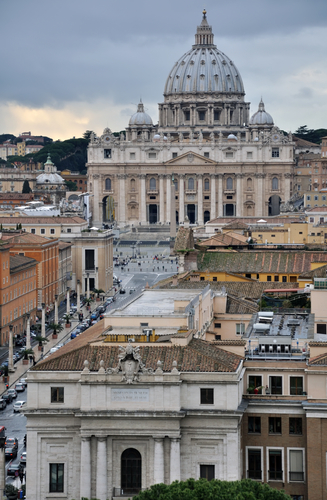News Briefs from the Vatican

A full day of news today at the Vatican. Here’s a short summary:
• Pope Benedict XVI has today accepted the resignation of Cardinal Claudio Hummes, prefect of the Congregation for Clergy, on grounds of age. He will be replaced by Archbishop Mauro Piacenza, Secretary of the same Congregation.
• Cardinal Paul Josef Cordes has stood down also on grounds of age as president of the Pontifical Council Cor Unum, the Pope’s charitable and humanitarian institution. He will be replaced by Archbishop Robert Sarah, until now Secretary at the Congregation for the Evangelization of the Peoples.
• Benedict XVI’s series of interviews with the German journalist Peter Seewald will be published on November 23 in English and other languages, according to Catholic News Service.
• The Holy Father has addressed participants of a conference on the Catholic press in today’s digital age. See below for a summary from Vatican Information Service of the Pope’s discourse.
• Cardinal Angelo Scola, the Patriarch of Venice, has announced the Pope will make a pastoral visit to Aquileia and Venice, May 7-8, 2011.
• The Prefect and the Secretary of the Congregation for Bishops and representatives from the Holy See have held a preparatory meeting with the Apostolic Visitators named by Pope Benedict for the upcoming Apostolic Visitation to the Church in Ireland.
• Iranian President Mahmoud Ahmedinajead has written a letter to the Pope, calling for more inter-religious dialogue and praising the Vatican for its position on the Koran burning episode. He last wrote to the Pope in 2006.
• The Pope received in private audience this morning Cardinal Jorge Liberato Urosa Savino, Archbishop of Caracas, Venezuela. The cardinal has recently been outspoken in his criticisms of the Chavez regime.
*****
VATICAN CITY, 7 OCT 2010 (VIS) - At midday today the Holy Father received participants in a congress on the Catholic press promoted by the Pontifical Council for Social Communications. The congress has been taking place this week in Rome.
Addressing the participants, who come from eighty-five different countries, the Pope referred to two specific aspects of the role of the Catholic press. On the one hand, he said, “there is the specific nature of the medium: the press; i.e., the written word and its importance and effectiveness in a society which has seen the burgeoning of dish antennae and satellites. ... On the other hand, the ‘Catholic’ connotation with all its attendant responsibility of remaining explicitly and substantially faithful, through daily commitment to following the path of truth.
“Catholic journalists must seek the truth with impassioned minds and hearts”, he added, “but also with the professionalism of competent workers equipped with adequate and efficient means”.
After then highlighting “the ever increasing importance of image in the world”, Benedict XVI noted that, “although this undoubtedly has positive aspects, image can also become detached from reality and give rise to a virtual world. This has various consequences, the first of them being the risk of indifference towards what is real”.
“Moreover, the transmission of an event, be it happy or sad, can be presented as a mere spectacle and not as an occasion for reflection. ... These aspects ... invite us to consider the danger that the virtual world may distance us from the real world and not stimulate us to seek reality, to seek the truth”.
The Pope went on: “In this context, the Catholic press is called ... to give full expression to its potential and, day by day, to give the reasons for its indispensable mission. ... The Christian faith shares a fundamental structure with communication: the fact that the means and the message coincide. Indeed the Son of God, the Word incarnate, is, at one and the same time, the message of salvation and the means though which salvation is achieved. This is not a mere concept but a reality accessible to everyone”.
“The Word of God came to man and was handed down to us though a book: the Bible. The word remains the fundamental and, in a certain sense, the essential instrument of communication. It is used in various forms today, and even in our image-driven society’ it still maintains all its value”.
“Christians cannot ignore the crisis of faith that has invested society, or simply hope that the heritage of values handed down over past centuries may continue to inspire and mould the future of the human family. The idea of living ‘as if God does not exist’ has revealed itself to be harmful. Rather, the world needs to live ‘as if God does exist’, ... otherwise all it produces is ‘inhuman humanism’”.
Recalling then how people who work in the communications media must “always put God at the top of their scale of values”, Benedict XVI concluded by affirming that the task of the Catholic press is “to help modern man to turn to Christ, the one Saviour, and to keep the flame of hope alight in the world, so as worthily to live today and adequately to build the future. For this reason I exhort you constantly to renew your personal choice for Christ, drawing on those spiritual resources which, though undervalued by the modern mentality, remain valuable, indeed, indispensable”.













